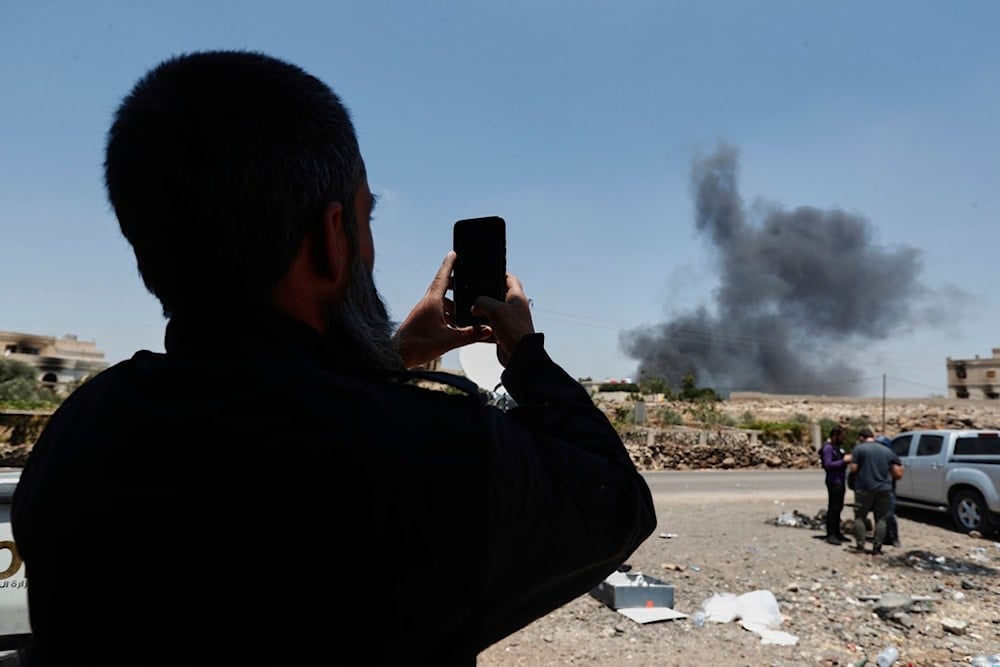Syrian Observatory: Over 1,000 killed in Sweida executions, clashes
More than 1,000 people were killed in Sweida, Syria, as violence escalates, while the SOHR urges UN probe into mass executions, worsening humanitarian conditions.
-

A Syrian security officer uses his phone to film smoke rising from burning houses in Mazraa village on the outskirts of Sweida city, in southern Syria, Sunday, July 20, 2025. (AP)
The Syrian Observatory for Human Rights (SOHR) has reported a staggering death toll of more than 1,000 people in Sweida province over the past seven days, following a wave of intense and deadly clashes. Among the dead are 194 civilians who were summarily executed, as violence escalates and humanitarian conditions deteriorate rapidly.
In a statement issued Sunday, the Observatory called for the formation of an independent UN investigation committee to probe what it described as a "catastrophic toll" and to hold those responsible for the bloodshed accountable under international law.
Sweida province, predominantly home to the Druze community, has been reeling from a sharp escalation in violence, leaving the region on the brink of collapse. The province is suffering from a near-total lack of drinking water, electricity, and essential food and medical supplies, with many of the wounded unable to access proper treatment.
Humanitarian collapse worsens in Sweida
Sweida’s National Hospital is reportedly overwhelmed, with morgue facilities overflowing and corpses decomposing in various parts of the facility, creating dire sanitary conditions. Due to the lack of medical supplies and ongoing violence, many families have been unable to bury their dead.
Amid the crisis, local and international media outlets, including those affiliated with the interim Syrian government, launched a widespread media campaign alleging massacres targeting women and children from Bedouin tribes at the hands of armed Druze militants. However, verification efforts revealed that only one such video was authentic, showing the killing of a woman, a man, and a child from Bedouin backgrounds. The rest of the footage was either unrelated to the current events, depicted violence against Druze civilians, or came from unrelated contexts elsewhere in Syria or abroad.
This media narrative sparked a mobilization among Arab tribes, culminating in renewed clashes across several areas of Sweida in recent days. Armed tribal fighters reportedly raided Druze homes and properties in various villages, exacerbating the violence and causing additional casualties.
Israeli airstrikes add to rising death toll
According to the Observatory, as of July 13, the total death toll had risen to 1,017, including 440 people from Sweida, among them 104 civilians (including six children and sixteen women). Additionally, 361 personnel from the Ministry of Defense and General Security were killed, including 18 members of Bedouin tribes and a Lebanese fighter.
The Observatory also documented 15 deaths from the Ministries of Defense and Interior as a result of Israeli airstrikes, alongside three people, including a woman and two unidentified individuals, killed in a strike on the Ministry of Defense building, and one journalist who died during the fighting.
Moreover, the SOHR confirmed that 194 people, including 28 women, 8 children, and one elderly man, were summarily executed by government security forces. Three Bedouin civilians, including a woman and a child, were executed by armed Druze fighters.
Government accused of fueling divisions
In light of these developments, the SOHR reiterated its appeal to the international community for an impartial and independent UN inquiry into all violations committed since the escalation began. It called for justice for the victims, particularly in cases of mass field executions and attacks on civilians, urging adherence to international humanitarian standards.
The Observatory also warned that the social fabric of Syrian society is being torn apart by the government’s backing of Arab tribal fighters and its facilitation of their movements through state checkpoints. Rather than working to defuse the crisis and prevent further bloodshed, the state’s support has, according to SOHR, contributed to deepening divisions and escalating violence.
Deadly clashes in Sweida
The province of Sweida has witnessed intense fighting in recent days between Druze factions and tribal armed groups, adding that the confrontations have spread across several villages and towns since July 13. Although Syrian regime forces were deployed to stabilize the situation, the violence escalated before a ceasefire was reportedly declared. The UN called for calm and reiterated the obligation of all actors to protect civilians under international law.
Meanwhile, "Israel" carried out airstrikes on southern Syria, including near Sweida and Daraa, as well as in central Damascus under the guise of protecting the Druze population from Syrian regime forces. The UN also expressed concern over civilian casualties resulting from those airstrikes.
UN High Commissioner for Human Rights Volker Türk issued a strong appeal to Syria’s interim authorities, urging them to ensure justice and accountability for the killings and other reported abuses during the recent wave of violence south of the country.
Commissioner Türk emphasized the need for independent investigations into the killings and abuses, warning that impunity could embolden further violations, reiterating that all responsible parties, whether state or non-state, must be held accountable.

 5 Min Read
5 Min Read








